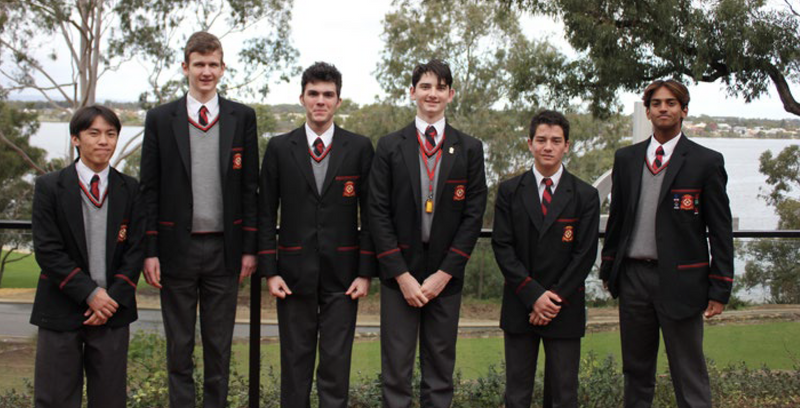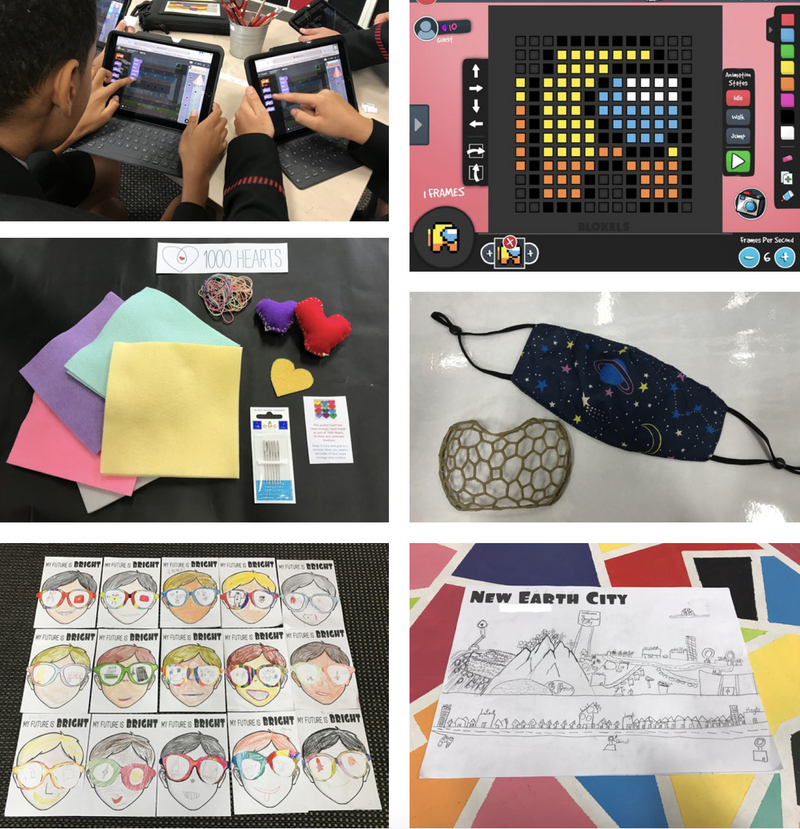Contact
T2 Workplace Learning
In the first two weeks of Term 2, Year 11 & 12 VET students undertook Workplace Learning in the examination break. From electrical to carpentry, cabinet making, automotive, marine mechanics and many more, VET students got to mix with employers from their chosen industry area to complete workplace learning hours mandatory for their pre-apprenticeship qualifications.
Feedback from employers was outstanding, with many willing to hire or take students on for further work opportunities.
For many boys getting up early and adhering to the employer, expectations can be quite an adjustment to the luxuries of school. Joseph Norrish, Year 11, mentioned, “I had to go from boarding to Canning Bridge Train Station out to Beckenham Station for 7 am each day to get to work with my electrical employer. Electrical is what I have wanted to do all my life and the chance to put my training at TAFE into action has made this year worthwhile”.
Perfecting our Craft - Project Based Learning in RE
The Year 8s at Aquinas College are Minecraft mad at the moment. Perhaps they’ve been Minecraft mad for years, but there was no doubt that the prospect of using Minecraft as a learning tool in Religious Education during Term 2 this year tantalised the minds of our Year 8 students.
There’s no question of Minecraft’s appeal, especially to Middle School aged boys. Whatever you make is only really bound by your imagination. It’s those endless possibilities that make Minecraft Education Edition an ideal tool for learning in Religious Education this term, as we look at the themes of Creation and Stewardship.
The engagement by our Year 8 students has exceeded expectations. Students were informed that they would be placed in groups at random in their respective Religious Education classes, as a means to help develop their Collaboration and Communication skills, two of the five twenty-first century learning skills that teaching staff across all learning areas will continue to develop in Middle School through Project-Based Learning. Being placed in groups of three or four at random did present an initial challenge to students as it meant being placed outside of comfort zones. This was done primarily to dissuade students from a “play” mentality. Minecraft, at its core, is a game. In order to move from a “play” mindset to a “project” mindset, placing students in groups at random was a necessary step. This is not to say, however, that our Year 8s will not be having fun. Fortunately, this has borne much fruit. It has been very pleasing to see our Year 8 students working collaboratively and using their maturing communication skills to achieve a common goal and see the bigger picture.
Students were given the freedom to choose between a number of Creation stories: The Fall, The Tower of Babel, Cain and Abel, and Noah’s Ark. In each of these stories are valuable lessons about the responsibilities mankind has towards creation, namely as regards our relationship with God, each other, ourselves, and the rest of creation. The students’ objective will be to - through their builds and subsequent presentation using iMovie - convey these learnings.
So why Minecraft? The creative aspect of Minecraft will encourage students to care for what they have had a hand in making, and there will be a sense of satisfaction that stems from tracking the progress of their work and subsequently completing it. Creativity and Accomplishment are core elements of Maslow’s Hierarchy of Needs, i.e. Self-Actualisation and Esteem. Students become more efficient learners when given opportunities to be creative and when progress is tangible. When the bigger picture becomes more apparent, students will be able to clearly associate their creative and collaborative experiences with syllabus content.
Our Year 8 students will produce something of substance and spectacle. It is hoped that a number of student projects will go on display for the entire College community to see.
LOGOS - an Aquinas myFUTURE uniPATH Pathway
I am currently studying on the uniPATH – LOGOS pathway which is run at Notre Dame University Australia (UNDA). From Monday to Friday I come to Aquinas and study Maths Methods, Physics, Chemistry, Literature and Physical Education Studies ATAR. However, on Friday I study at UNDA, completing a first-year university unit in Philosophy. My thoughts prior to starting the philosophy course were thinking of how good an opportunity this course is, and that I didn’t want to miss out on it. Initially, I was more focused on getting an idea of how university life really is, for example, the style of learning. Each week we arrive at Notre dame for a 9:30am start. We start with a lecture, going through PowerPoint slides, on different topics for the first hour. After a short break, we would go into a Socratic dialogue, where we would split, work in groups and share different points of view about the learnings.
After getting used to LOGOS, my preconceptions of it changed and I started finding some large interest in the different topics, mainly ‘What is Truth’. This lesson focused on the three theories of truth, different types of truths, different methods of reasoning and types of propositions or statements. After being a part of uniPATH-LOGOS, I believe it is a really good way for students to get early insight into university life. Not only the way that assessments are conducted, but also how to manage time to fit in the vodcasts from our teachers. It encourages students to better plan their timetable of where and when they can do work.
Another aspect of LOGOS that I really liked was how much deeper the thinking was. For me, I think it would have been a waste not to do the program, as what we have learnt has been very interesting, and different to what we learn at school. It was also a really fun experience to hang out with your friends in Fremantle over lunch before we got to doing the vodcasts for our Aquinas College ATAR courses.
Talk 4 Writing: Information Reports
In Talk 4 Writing we learnt about the structure of report writing.
First, we demonstrated what we already knew about report writing by writing a report on the animal of our choice. We used our model text to look at the structure of an information report and how sub-headings help the reader to quickly find information. We came up with “hooks” for our introduction, using a question and an interesting fact to engage the reader. We also learnt about note-taking when researching a subject for a report.
We practised our notetaking skills when writing our reports about cities in Australia and animals all around the world. We have learnt about editing to improve our spelling, punctuation vocabulary and report writing structure. We also did some actions in Talk 4 Writing to help us memorise our model text about parents.
It was very fun doing it in real life and making up actions.
Aquinas myFUTURE Internship Program

Aquinas myFUTURE provides an enrichment opportunity for Aquinas College students with a direct link to real-world experience through our Internship partnerships.
The asynchronous nature of our Aquinas myFUTURE blended learning model allows for the flexibility to conduct these Internships as an embedded element of a student’s Senior School journey.
Many of our current Year 11 students have recently submitted an expression of interest for this exciting and valuable opportunity. In the coming weeks, they will be put in contact with our partnered organisations and to finalise the details of their placement.
One of the strengths of this model is the flexibility to meet the needs of our students and modern workplaces. There are two models which will be the most common arrangement for our Internships being; on Fridays during the term, or as an intensive vacation experience similar to what many university students experience. Establishing these networks early and gaining invaluable real-world experience puts our students ahead of the curve in such a competitive marketplace. Some of the placements secured for our students exist in the following occupations:
- Accountancy and Business
- Property and Asset Management
- Agricultural Business
- Events and Marketing
- Agricultural Science
- Law
- Architecture
- Orthopaedics
- Engineering
- Robotics and Technology
As a community, these Internships are an outstanding opportunity for our students and we are very grateful to those organisations who have offered to take on a student or small group of students.
If you have any questions relating to this Aquinas myFUTURE Internship model, please make contact with Graham Powell, Director Aquinas myFUTURE.
T2 2021 - STEM
Term 2 marked the start of everything Technology for STEM in the Junior School, we even 3D printed mask spacers during the Covid safety requirement weeks early in the term.
The Early years have been introduced to coding, bringing the Foos from Codespark to life and Pre-Primary have coded their way through the classic tale of The Gruffalo, organising steppingstone actions to get the mouse safely through the story. Year 4 students began their journey into Bloxels with some pixelation of popular characters. Some students took the time to look into their future from a technological perspective and designed self-portraits detailing the items that will potentially exist in their lifetime, as well as future civilisation on other Earth-like planets. And finally, after some convincing that a needle was officially a form of technology, we embarked on the 1000 hearts program, which aims to reach out to those who are lonely or feeling separated from loved ones during the pandemic. We cut out felt hearts ready to sew and send to the local aged care homes to make sure the residents know we are thinking about them. Phew – halfway through Term 2 and still so many things to come!
AC TV Crime Activity
BREAKING NEWS 🎥
Mr McFadden has been murdered!
No...not really. He's fine. But members of AC TV gathered the other week to undertake an intensive training session - led by BBC Producer (and wife of Mr McFadden) Mrs Eastman - where they learned to craft a news story based around the tragic murder of our College Principal.
Take a look behind the scenes.
Project-based learning and the 21st Century learner
The focus and techniques used in the acquisition of a foreign language have certainly changed over time. Today language teachers successfully integrate digital media with inquiry-based learning. The language student is exposed to a myriad of linguistic and cultural experiences and can interact with authentic material. This enrichment helps students connect and build an understanding of their immediate world and tolerance of foreign cultures. In these unprecedented times, these character traits are expected and highlighted.
Prof Satti explains, ‘Having Pedagogical structure for Junior School students maximises their engagement. Tasks that are relevant really promote creativity and collaboration. The use of technology supports the learning and enhances the 21st-century skills.”
During any given lesson, a Global Studies or Language student will demonstrate critical thinking, creativity, collaboration, communication and Christian character. These 21st Century skills are transferable between courses and enhanced throughout life.
Mr James Brown who teaches Global Studies comments, “Having a large focus on student-directed learning this year appears to be going very well. The boys have improved their ability to reference their work. I believe this is important for them to develop early if they are wishing to attend university.”
At Aquinas College, project-based learning can occur as a face-to-face discussion or on the dynamic Teams Wall. This training ground provides our students with the tools to succeed in school. It also assists them to be an outstanding contributor to the task at hand and for their peers.
Prof Leopardi reflects, “Students who are confident learners are encouraged to help others and this I believe builds character for all involved.”
The Language/Global Studies teachers are teaching traditional syllabus points using modern methodology. They are especially keen on how the Class OneNote can offer opportunities for differentiation. Students are required to complete a variety of activities in any given lesson according to their level of ability and determination.
Mrs Megan Monks and Mr Michael Evelegh agree that OneNote offers greater diversity for the learner.
In conclusion, project-based learning tasks need a wide-angle lens coupled with clear instruction and strong research parameters. Successful learning occurs when learners work together and listen to different viewpoints. A more complete grasp of the concepts is made. Working independently on the same task would not provide the same depth of understanding.
Two are better off than one because together they can work more effectively. (Ecclesiastes 4:9)
T2 Middle School Veritas Program Update
A Year 7 boy’s journey in character development has continued this term with students examining inspiring people from World War 1 and what virtues they espouse. With this knowledge, each boy considered how they could improve their personal character by comparing the conditions their inspiring person faced in World War 1 with their current life circumstances identifying what their character strengths are and which they weak in and could improve.
The next unit of study in the Year 7 Veritas course is Cybersafety. Our students use the internet to learn, relax, have fun, express themselves, share interests, access services and connect with friends, family and online communities. While this increased connectivity has enormous benefits, it also places students at increased risk of online harms such as cyberbullying, image-based abuse, grooming, privacy breaches and online hate. Student’s online experiences play a significant role in their social and emotional development, which is why cyber safety education is a key component of the Year 7 Veritas program aiding in protecting the safety and wellbeing of our students online.
This term the Year 8 Veritas course undertook an evidence-based drug and alcohol education program. The college uses a harm minimisation approach aimed to reduce the risks associated with drug use, and promote healthier, alternative behaviours for students. This comprehensive approach to drug education gives boys the opportunity to gain accurate information about drugs and drug-related issues, including the misuse of alcohol, vaping/e-cigarettes and illicit substances. They were also provided with the opportunity to explore some communication strategies that can be helpful in disengaging people from being pressured into drug-related activities.
This Term sees the Year 9 boys move further along their path of transformation by being confronted with performing in the Year 9 Dance Spectacular, one of the many challenges’ boys will meet throughout the Odyssey Program. All Year 9 boys have been learning a group dance routine choreographed by specialist Dance Instructors with the goal being to proficiently perform their dance in front of family and friends at the Year 9 Dance Spectacular on the evening of Wednesday 2nd June. This will be the night when boys will be challenged to show courage and confront their fear by stepping on stage in front of 700+ people to perform their routine.
The benefits of this event to the development of character in a boy are huge: he has the opportunity to step outside the ‘Man Box’ challenging the stereotype that men don’t dance, he learns to rely on others as part of a team as well as being responsible for his actions within a team; he learns to use mechanisms to lower his stress levels in situations that are uncomfortable; he has the opportunity to demonstrate a Growth Mindset by stepping outside his comfort zone, and above all, he gets to have fun with his peers.




